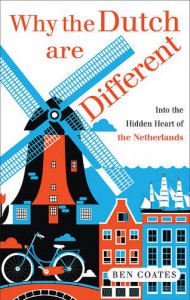Murder by Death
I read cozy and historical mysteries, a bit of Paranormal/UF, and to mix it up, I read science and gardening books on occasion.
Why The Dutch Are Different: A Journey Into the Hidden Heart of the Netherlands

When my best friend of almost 30 (gasp!) years and I were at university, she met a Dutchman who was spending a year studying abroad. In the way of such things, she married him and moved to the Netherlands. It took me about 5 years to get over that curiously American reluctance to travel overseas (so decadent!) to see her (time warp: that first non-stop round-trip ticket on KLM was $250), but once I did I was hooked and she was stuck with my not-infrequent visits until my move to Australia, where the sheer number of hours involved put a damper on my spontaneous visits.
Maybe because it was my first European destination, but I love the Netherlands best and Amsterdam is my favorite city in all the world. I'm forever quizzing my poor BF and her husband about all things Dutch ("what's the word for this? How do you say that again?) and I constantly gush about most of it: the architecture, the bike lane system, the flowers!!! So when MT saw this at the bookshop, it was a no-brainer. If you asked him, he'd probably say it was the easiest present decision for me he's ever had to make.
I devoured it and moderately tortured both him and my BF by quoting and exclaiming over particularly fascinating facts (people used to use windmills to send messages! NL actually invaded England in 1688/89!). At 297 pages the book is densely packed with information yet very readable. Coates uses Dutch history - both the good and the bad - to create a context for the liberal and tolerant culture they have today and muses over how and why that liberalism and tolerance is being tested.
Coates has done his research and includes a selected bibliography at the back with further reading and sources. He covers the gamut of what makes NL different, including the most sensitive topics and he makes frequent mention of how verboten some topics were with the normally open Dutch, making it awkward at best to objectively discuss these issues. While it was obvious to me that he tried to represent the largest cross-section of Dutch society he could and strived for objectivity, this remains a cross-section. I'm sure my BF's husband would find a few things he'd disagree with, but largely, I thought it just perfect: well-written, well-edited* and relatively objective; if you find Dutch culture interesting, this would be an excellent overview.
*The only editing errors I ever ran into was a handful of missing words. Oddly enough, it was actually the same word "to" every time.
 9
9
 7
7



